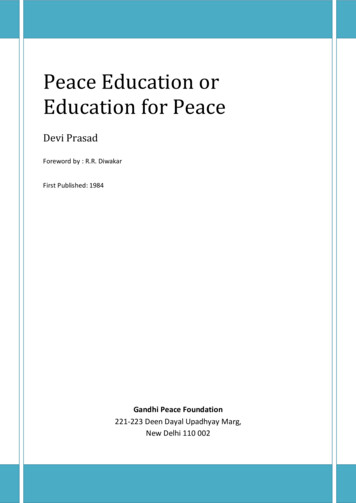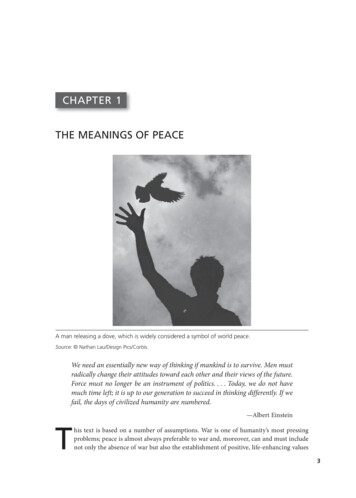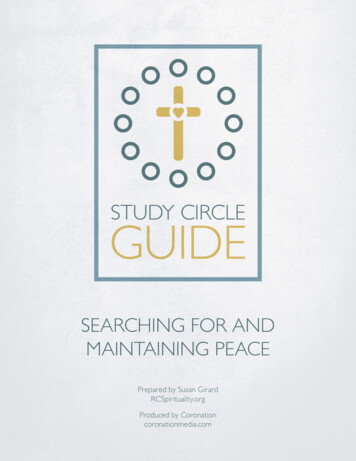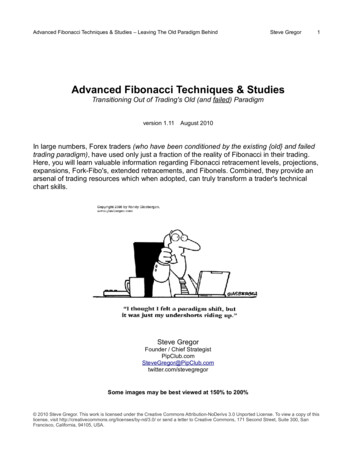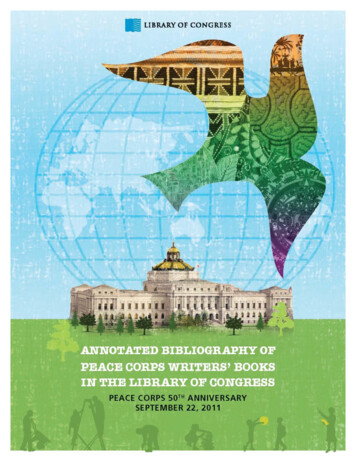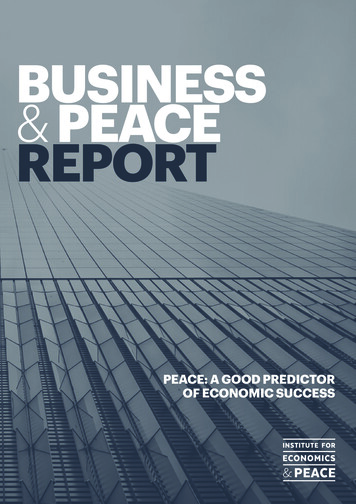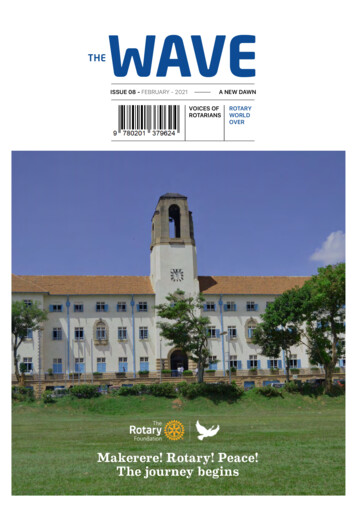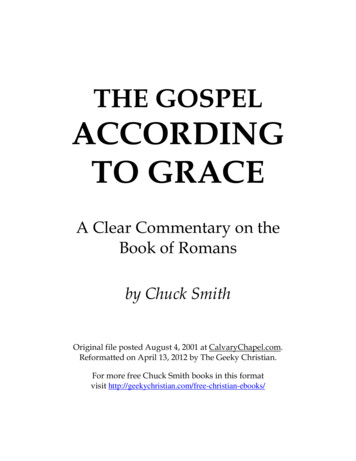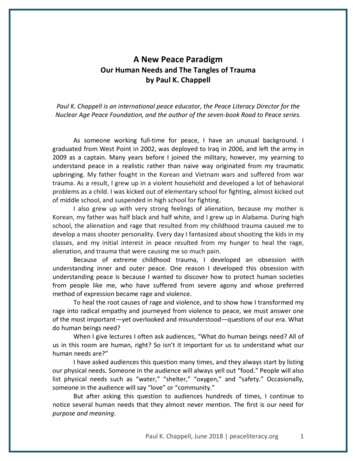
Transcription
A New Peace ParadigmOur Human Needs and The Tangles of Traumaby Paul K. ChappellPaul K. Chappell is an international peace educator, the Peace Literacy Director for theNuclear Age Peace Foundation, and the author of the seven-book Road to Peace series.As someone working full-time for peace, I have an unusual background. Igraduated from West Point in 2002, was deployed to Iraq in 2006, and left the army in2009 as a captain. Many years before I joined the military, however, my yearning tounderstand peace in a realistic rather than naive way originated from my traumaticupbringing. My father fought in the Korean and Vietnam wars and suffered from wartrauma. As a result, I grew up in a violent household and developed a lot of behavioralproblems as a child. I was kicked out of elementary school for fighting, almost kicked outof middle school, and suspended in high school for fighting.I also grew up with very strong feelings of alienation, because my mother isKorean, my father was half black and half white, and I grew up in Alabama. During highschool, the alienation and rage that resulted from my childhood trauma caused me todevelop a mass shooter personality. Every day I fantasized about shooting the kids in myclasses, and my initial interest in peace resulted from my hunger to heal the rage,alienation, and trauma that were causing me so much pain.Because of extreme childhood trauma, I developed an obsession withunderstanding inner and outer peace. One reason I developed this obsession withunderstanding peace is because I wanted to discover how to protect human societiesfrom people like me, who have suffered from severe agony and whose preferredmethod of expression became rage and violence.To heal the root causes of rage and violence, and to show how I transformed myrage into radical empathy and journeyed from violence to peace, we must answer oneof the most important—yet overlooked and misunderstood—questions of our era. Whatdo human beings need?When I give lectures I often ask audiences, “What do human beings need? All ofus in this room are human, right? So isn’t it important for us to understand what ourhuman needs are?”I have asked audiences this question many times, and they always start by listingour physical needs. Someone in the audience will always yell out “food.” People will alsolist physical needs such as “water,” “shelter,” “oxygen,” and “safety.” Occasionally,someone in the audience will say “love” or “community.”But after asking this question to audiences hundreds of times, I continue tonotice several human needs that they almost never mention. The first is our need forpurpose and meaning.Paul K. Chappell, June 2018 peaceliteracy.org1
Purpose and MeaningWhat is more important for humans: food or purpose and meaning? When Itaught a Peace Leadership course in northern Uganda, where people had lived througha civil war, I asked the group of about twenty-five participants, “What is more importantfor humans: food or purpose and meaning?” They all said, “Purpose and meaning.” Oneof the participants raised her hand and explained, “Purpose and meaning is moreimportant than food, because if you have food but don’t have any purpose andmeaning, you won’t want to eat. You won’t want to live.”If we have a lot of food, but don’t have any purpose and meaning, we will losethe will to live. On the other hand, if we have a lot of purpose and meaning, but don’thave any food, we will work very hard to find some food. Someone might say, “Food ismore important than purpose and meaning, because if every single human being werecompletely deprived of food, our species would go extinct.” However, isn’t this also truefor purpose and meaning? If every single human being were completely deprived ofpurpose and meaning, wouldn’t our species also go extinct?We are the only species on the planet that can commit suicide even when wehave food, water, safety, shelter, freedom, and good health. This human vulnerabilityreminds me of the saying from Jesus: “Man does not live by bread alone.”1 This humanvulnerability also reminds me of a quote from philosopher Friedrich Nietzsche, who said,“He who has a Why to live for can bear almost any How.”2 In other words, a person whohas a Why to live for, a purpose in life, can bear almost any How, almost any hardship.To understand the importance of purpose in life, we can do a simple thoughtexperiment. Imagine two different people, and consider which person would have abetter chance of surviving. The first person has no food and no purpose in life. Thesecond person has no food, but has a lot of purpose in life—a higher purpose in life.Which person will have a better chance of surviving? Obviously, the second person.Abraham Maslow’s “hierarchy of needs” lists physical needs such as food, water,and safety as our most basic needs, but this hierarchy is flawed because it does notrecognize how purpose and meaning serve as a foundational need that helps us morereliably fulfill these physical needs. In the military I learned that when people aredealing with physical and psychological adversity that must be overcome to meet theirphysical needs, a strong sense of purpose and meaning greatly increases their power toovercome adversity. In this way, our physical needs are like a destination, and purposeand meaning provide us with metaphorical fuel that helps us arrive at that destination,especially when it seems so far away that people are at risk of losing hope.Throughout history, effective peace leaders and military leaders have realizedthat our need for purpose and meaning is so powerful that many people, if you givethem enough purpose and meaning in life, will willingly give up food and safety. Theycan even willingly die for a cause that gives them purpose and meaning. If a civil rightsleader convinces activists that they are struggling for freedom and justice, they willwillingly get beaten up and go to jail. They can even willingly die for their cause. If amilitary leader convinces soldiers that they are fighting for their family, country, orfreedom, they will willingly give up safety and subject themselves to physical hardshipsPaul K. Chappell, June 2018 peaceliteracy.org2
such as sleep deprivation, lack of shelter, and hunger. They can even willingly die fortheir cause.Psychiatrist and Nazi concentration camp survivor Viktor Frankl also understoodthe power of purpose and meaning. He realized that when people are in a Naziconcentration camp and lack safety and food, their sense of purpose and meaningbecomes even more important because it helps them compensate for physical andpsychological hardship. In a similar way, the U.S. military teaches that to survive as aprisoner of war, the most important thing is to maintain a strong sense of your purposein life, because again, purpose helps us overcome physical and psychological adversity.Like the U.S. military, civil rights leader Bernard Lafayette said the civil rights movementtaught people that “in order to remain strong during a kidnap situation, you mustmaintain a clear sense of purpose in life, and have a motto that states what your lifemeans or some particular value that you have chosen.”3As a child I always benefitted when adults helped increase my sense of purpose,such as helping me understand why it was important for me to learn something orperform a task in a particular way, rather than just saying, “Because I said so.” To healmy childhood trauma and strive toward my full potential as a human being, I needed tofind healthy forms of higher purpose and deep meaning in life. But first I needed tounderstand our other human needs.BelongingWhen I ask audiences what our human needs are, another need they almostnever mention is our need for belonging. I then ask them, “Is belonging a basic humanneed? What is more important for humans: food or belonging?”After giving the audience a few moments to ponder this, I ask, “What is moreimportant for a wolf-pack: food or belonging? Keep in mind that belonging is theprecondition that allows wolves to obtain food, because they are social animals thathunt as a pack, as a community. In a similar way, belonging is the precondition thatallows humans to obtain food, water, safety, shelter, and all of our physical needs,because we rely upon a community for our survival. If you put a two-year-old child inthe wilderness alone, that child will starve to death.”4The following diagram depicting Abraham Maslow’s hierarchy of needs showshow he got it backward. Although he lists physical needs such as food and safety ascoming before belonging, the opposite is true. Since the time of our earliest ancestorsuntil today, belonging to a community has been the foundation that has allowedhumans to obtain food and safety.Paul K. Chappell, June 2018 peaceliteracy.org3
Figure 1: Maslow’s Hierarchy of NeedsTo help us better understand how Maslow got it backward, psychologist PamelaRutledge explains why belonging, in the form of social connection and collaboration, isin fact a basic need that must be satisfied before humans can obtain food and safety:Maslow’s model, as its name suggests, organizes groups of humanneeds into levels in a hierarchical structure, forming a pyramid. It’ssimilar in some senses to video games in that you have to fulfill therequirements of one set of needs before you can level up. But the samethings that make Maslow’s model cognitively appealing—that sense oforder and predictability— also make it wrong. If only life were so simple.Here’s the problem with Maslow’s hierarchy. None of these needs[such as food and safety]—starting with basic survival on up—arepossible without social connection and collaboration. None of Maslow’sneeds can be met without social connection. Humans are social animalsfor good reason. Without collaboration, there is no survival. It was notpossible to defeat a Woolly Mammoth, build a secure structure, or carefor children while hunting without a team effort. It’s more true now thanthen. Our reliance on each other grows as societies become morecomplex, interconnected, and specialized. Connection is a prerequisitefor survival, physically and emotionally Needs are not hierarchical. Life is messier than that. Needs are,like most other things in nature, an interactive, dynamic system, but theyare anchored in our ability to make social connections. Maslow’s modelneeds rewiring so it matches our brains. Belongingness is the drivingforce of human behavior, not a third tier activity. The system of humanneeds from bottom to top are dependent on our ability to connect withothers. Belonging to a community provides the sense of security andagency that makes our brains happy and helps keep us safe.5Paul K. Chappell, June 2018 peaceliteracy.org4
What is the most common characteristic that all serial killers and mass shootershave in common? In his book Female Serial Killers, Peter Vronsky says that “socialisolation—loneliness—might be arguably the most common characteristic of thechildhood of serial killers.”6 A lack of belonging in the form of social isolation, loneliness,or alienation is also common among mass shooters. So what is more important forhumans: food or belonging? People do not become serial killers or mass shootersbecause they lack food. But people can become serial killers or mass shooters becausethey lack belonging.7Self-WorthWhen I ask audiences what our human needs are, another need they almostnever mention is our need for self-worth. I then ask them, “Is self-worth a basic humanneed? What is more important for humans: self-worth or staying alive?”After giving the audience a few moments to ponder this, I say, “It depends onthe person,” and then I discuss how people can prioritize self-worth over staying alive.Roman general Julius Caesar, who became emperor of Rome through militaryconquest, said, “Prestige has always been of prime importance to me, even outweighinglife itself.”8 Caesar placed a higher priority on prestige, status, and self-worth than onstaying alive, and this was reflected in his actions. On many occasions, he risked his lifein war to protect and increase his prestige, status, and self-worth.Caesar was not unusual, because in cultures around the world, many peoplehave made a comparison between self-worth and life itself. In Judaism there is an ideathat humiliating people is akin to murdering them, which can describe the painful senseof annihilation that people in the modern world can feel when they are bullied andpublicly humiliated. According to Rabbi Aryeh Citron, “One should be extremely carefulto never shame another in public. This sin is akin to murder; just as blood is spilled in theact of murder, so too when one is shamed the blood drains from his face.”9This comparison of humiliation and murder is not just metaphorical, becausethroughout human history many people who were humiliated would kill themselves, orthey would respond to humiliation by risking their lives to regain their sense of selfworth. During the Trojan War, the Greek soldier Giant Ajax felt humiliated and betrayedby his comrades. As a result, he fell on his sword and killed himself. When the samurai inmedieval Japan were humiliated and their “honor” was wounded (“honor” back thenwas equivalent to “self-worth”), many of the samurai would kill themselves throughritual suicide. If you were to insult and humiliate a man in Europe or the United Statesduring the eighteenth century, endangering his honor and self-worth, he might risk hislife by challenging you to a duel.10 Today many incidents of youth gang violence amongboth boys and girls are caused when a disrespectful act attacks someone’s sense of selfworth, which can cause this person to retaliate with violence even at the risk of going toprison or dying.Furthermore, when people today are bullied, humiliated, and their self-worth iswounded, some of these people kill themselves, and many of these people might not killPaul K. Chappell, June 2018 peaceliteracy.org5
themselves, but they at least think about killing themselves. If bullying is unable to harmsomeone’s sense of self-worth, then suicidal thoughts are unlikely to occur as a result ofbeing bullied. But if someone who is bullied feels worthless to the point of hatingoneself, then suicidal thoughts are likely to occur. To perform a thought experiment thatshows how self-worth is a basic human need, imagine if I had a magic dial that couldcontrol your sense of self-worth. If I turned the dial so low that you felt completelyworthless and even hated yourself, it is likely you would think about killing yourself,even if all of your physical needs were met.Although it is becoming more common for girls to bully each other with acts ofphysical aggression, girls in the past more often relied on social aggression. Self-worth issuch a vulnerable part of the human condition that women in many cultures target andattack the self-worth of other women, sometimes in an attempt to destroy their lives orinduce suicidal thoughts. In her book Social Aggression Among Girls, Marion K.Underwood describes the intense pain that can result from attacks upon one’s selfworth:When adolescent girls engage in social aggression, they areenacting their wrath by hurting what other girls strongly value within thevery domain that is often their own focus of concern [such as self-worthor relationships]. When seeking revenge, nothing may satisfy more thanhurting someone in the arena in which you yourself feel most threatened. . . The evidence to date suggests both that social aggression is fairlywidespread among adolescent girls and that it is perceived as extremelyhurtful. In a large-scale survey with more than 6,000 secondary studentsin Great Britain, 20% of youth reported having been bullied by othersspreading rumors about them. Regardless of gender or age, youthreported that the most stressful type of bullying for them was being thetarget of malicious rumors.11Today when people’s self-worth is wounded, they might not kill themselvesquickly the way Giant Ajax did by falling on his sword, or the way a samurai wouldthrough ritual suicide, but they do kill themselves slowly through alcoholism, drugaddiction, stress, or some other means. There are also examples where people prioritizeself-worth over food and health, even to the point of risking their lives. One example isanorexia, which can affect men and women, although it affects far more women thanmen.According to a study by the National Association of Anorexia Nervosa andAssociated Disorders, five to ten percent of people with anorexia die within ten years,eighteen to twenty percent of people with anorexia die within twenty years, and onlythirty to forty percent of people with anorexia ever fully recover.12 Anorexia is a tragicexample where people prioritize self-worth over food, health, and in some cases evenstaying alive. Anorexia can also be about the desire to have control in one’s life, which Iwill address later when discussing the tangles of trauma.Paul K. Chappell, June 2018 peaceliteracy.org6
Self-worth is a primary driver of human behavior. Think of how much humanbehavior is driven by people simply wanting to feel worthy rather than worthless. Incountries that have speed limits, why do so many people have a desire to ownLamborghinis and Ferraris? Cost prevents most of these people from acting on thisdesire. A person can certainly appreciate these vehicles as works of art or astechnological marvels, but for the most part these luxury cars are status symbols thatincrease people’s sense of self-worth. And consider how applying to college can affectthe self-worth of high school students, with some students feeling an unhealthy amountof anxiety because they are worried about not getting accepted to Harvard, Yale, orother prestigious universities. A person can have a very happy, meaningful, fulfilling, andsuccessful life without going to Harvard or Yale. The anxiety that high school studentsfeel over getting accepted to a prestigious university has a lot to do with their self-worth(or the self-worth of their parents).Many people in our society are not taught how to feed their need for self-worthin healthy ways. Furthermore, we live in a society that tends to value our worth basedon how much money we make, and this has harmful side effects. If we make a lot ofmoney, many people in our society view us as worthy, even if we lack empathy,integrity, and a sense of service to others. If we make little money, many people in oursociety view us as worthless, even if we have outstanding personal qualities. MartinLuther King Jr. said, “We are prone to judge success by the index of our salaries or thesize of our automobiles, rather than by the quality of our service and relationship tohumanity.”13 This is something we can change by improving our society’s value system,which first requires us to understand our human needs in a more realistic and thoroughway.ExplanationsWhen I ask audiences what our human needs are, a need they have never oncementioned is our need for explanations. As far as we know, when lightning strikes theground we are the only species that asks “why?” As far as we know, we are the onlyspecies that comes up with religious and scientific explanations that attempt to explainthe underlying cause of lightning. Every known culture has explanations for lightning,natural disasters, and the origin of humanity. Every known culture has “creation stories”that offer explanations for how various aspects of our reality came into existence.When bad things happen to us, we also have a need to ask “why?” Our way ofexplaining why bad things happen to us can include a wide variety of explanations, suchas luck, fate, or karma, which are human concepts. When people have problems inromantic relationships, they also have a need for explanations. Why did this personbetray me? Why doesn’t this person like me? Why is this person upset today? Why am Ihaving relationship problems with this person? As far as we know, fruit flies don’t askthose kinds of questions.If you ever doubt that human beings have a need for explanations, look at howpeople react when a terrorist attack happens. Practically everyone wants to find anexplanation (even if the explanation is as general as “evil”), which gives those in powerPaul K. Chappell, June 2018 peaceliteracy.org7
an opportunity to spread misleading explanations. In fact, people will often argue aboutwhich explanation is correct. For example, when a mass shooting happens in the UnitedStates, people can argue about whether it was caused by mental illness, an evil gene,not enough gun control, too much gun control, violent media, bad parenting, bullying,or a combination of factors. When our economy descends into a recession, there isalways an intense debate to explain why.Our need for explanations is so powerful that if people don’t have an accurateexplanation, they will come up with an inaccurate explanation. People in medievalEurope lacked microscopes and did not know about viruses and bacteria. Needing anexplanation for the cause of plagues, many Europeans said plagues were caused by thealignment of the planets or the wrath of God. In The Cosmic Ocean I discuss the dangersof inaccurate explanations, not only in terms of preventing us from understanding andsolving the root causes of our problems, but also in terms of sustaining injustice, sinceunjust policies are always based on inaccurate explanations.Frederick Douglass, who was born a slave in 1818 and later became an advocatefor women’s rights and the abolition of slavery, describes one of the inaccurateexplanations that sustained state-sanctioned slavery in America: “[As a child Iwondered] why am I a slave? Why are some people slaves and others masters? Thesewere perplexing questions and very troublesome to my childhood. I was very early toldby some one that ‘God up in the sky’ had made all things, and had made black people tobe slaves and white people to be masters I could not tell how anybody could knowthat God made black people to be slaves.”14Again, our need for explanations is so powerful that if people do not have anaccurate explanation, they will come up with an inaccurate explanation. A commonexample of this can be seen in childhood trauma. When people who suffer fromchildhood trauma wonder, “Why me?” or “Why did this happen?” it is because theycrave an explanation.15 When children blame themselves for their parents’ divorce, it isalso because they crave an explanation, even if the explanation is inaccurate. An abusedchild can come up with many inaccurate explanations, including, “This person abusedme because I am bad and deserve it.” The book Treating Trauma and Traumatic Grief inChildren and Adolescents, written by Judith A. Cohen, Anthony P. Mannarino, and EstherDeblinger, tells us:Following a traumatic event, children typically search for anexplanation for why something so terrible has happened to them or theirloved ones. If no rational explanation is found, children may developinaccurate or irrational cognitions about causation in order to gain somesense of control or predictability. A very common irrational beliefinvolves children blaming themselves, either by taking responsibility forthe event itself (“He sexually abused me because I wore a dress”) or fornot foreseeing and avoiding the event (e.g., “I should have known Dadwould be in a bad mood—why didn’t I warn Mom to be especially nice sohe wouldn’t have beaten her up?”; “I should have stopped my brotherPaul K. Chappell, June 2018 peaceliteracy.org8
from going to school today so he wouldn’t have gotten shot on the wayhome”).Alternatively, although not blaming themselves directly for thetraumatic event, children may come to believe that they are bad,shameful, or otherwise lacking in some way that “justifies” bad thingshappening to them [such as the explanation] “I must be stupid for this tohave happened to me.” In this manner the world remains fair,predictable, and makes sense . . . Developing realistic cognitions ofresponsibility (i.e., blaming the parent perpetrator) is often more difficultand painful for children than blaming themselves.16Explanations create our worldview. All animals, including human beings, havephysical needs for their survival, but human beings have some unique psychologicalneeds for their survival that no other animal seems to have. One of these uniquepsychological needs is that we must have a worldview, which can consist of political,religious, scientific, philosophical, or cultural beliefs. This need for a worldview is sopowerful that if you threaten people’s worldview, they will often react as if you arethreatening their physical body. One reason for this is that if your worldview, or in otherwords everything you believe to be true, ends up not being true, the disillusionment youexperience might be so severe that you will be at risk of committing suicide or goinginsane.Because our worldview shapes our sense of purpose, meaning, belonging, andself-worth, people can also react aggressively to threats upon their worldview becausetheir sense of purpose, meaning, belonging, or self-worth is threatened. Sometimes,people will defend an explanation in their worldview because they don’t want toexperience the embarrassment and reduction in self-worth that might result fromadmitting they are mistaken.Maslow’s hierarchy of needs does not mention humanity’s need for a worldviewas basic to our survival.17 What is more important for human beings, our need forexplanations or our need for food? Our need for explanations is a foundational needthat expands our access to food and other physical necessities, because it allows us toask, “Why are my crops dying? Where did all of the water go? Why am I not safe? Whatis causing this disease? What causes fire, and how can I control fire?” According toMaslow’s hierarchy of needs, when people lack food, water, and safety, they simplywant food, water, and safety. But in every known culture, when people lack food, water,and safety, they also want explanations for why they lack food, water, and safety. Theyalso want answers.An adult human brain cannot function without a worldview. This is why childrennaturally start forming their worldview at a very early age when they seek explanationsby asking countless questions. Four-year-old children can ask questions such as, “Wheredo babies come from? Why does it rain? Why is the sky blue?” Sometimes adults canbecome annoyed by the large amount of questions that young children ask. Youngchildren need explanations and a worldview, yet this basic human need is not listedanywhere in Maslow’s hierarchy of needs.Paul K. Chappell, June 2018 peaceliteracy.org9
Because our brains cannot function without a worldview, many people wouldrather die than lose their worldview. Many people would rather die than lose theirreligion, which comprises a large part of their worldview. As John Steinbeck says in TheGrapes of Wrath, human beings are the only species on the planet that will die for anidea.18 We cannot understand our modern political and social problems unless weunderstand our human need for explanations and a worldview, because this basic needis behind so many of these problems.Because we can react to a threat upon our worldview as if our physical body isbeing threatened, this is one reason why the Roman Catholic Church threatened Galileoand censored his ideas when he said the earth revolves around the sun. He hadthreatened their worldview. This is also why it can be so difficult to challenge people’sviews on politics and religion without them becoming aggressive. Have you ever seensomeone become aggressive over a discussion about politics or religion? You haveprobably seen this happen more often than you can count.Usually this aggression takes the form of posturing (what I describe as “warningaggression” in The End of War and The Cosmic Ocean), but sometimes this aggressioncan become lethal, since there are examples in history where people have been willingto risk their lives and kill others in order to protect their political or religious worldview.Furthermore, just as the “flight response” causes many animals to create distancebetween themselves and a threat when their bodies are in danger, many people willcreate distance when you threaten their worldview by walking away from you,unfriending you on Facebook, or separating themselves from you in some other way.I meet many well-meaning people who say, “I often give people facts andevidence, but people don’t care about facts and evidence when it contradicts what theybelieve.” What we must understand is that a worldview can function like a force field,and facts and evidence can bounce off that force field. A human being is not a computerthat automatically absorbs the information we type into it. Unlike human beings,computers don’t have a worldview that consists of political, religious, scientific,philosophical, or cultural beliefs.In The Art of Waging Peace I discuss how we can tie new ideas into people’sexisting worldview, rather than directly attacking their worldview. This pamphlet is anexcerpt from an upcoming book I am writing titled The Transcendent Mystery. In thatbook I will take these ideas further to discuss how human beings actually share auniversal worldview that transcends religion, nationality, and culture, which manypeople do not know about, and how we can harness the power of this universalworldview to create a more peaceful and just world.Our Shared Human HungerWhen we understand our shared human hunger for purpose, meaning,belonging, self-worth, and explanations, we can better understand how Adolf Hitler wasable to appeal to people. Hitler offered people purpose and meaning. He also offeredthem belonging and self-worth through a sense of national and racial superiority. Andhe offered them explanations. People in Germany wanted to know, “Why am I poor?
A New Peace Paradigm Our Human Needs and The Tangles of Trauma by Paul K. Chappell Paul K. Chappell is an international peace educator, the Peace Literacy Director for the Nuclear Age Peace Foundation, and the author of the seven-book Road to Peace series. As someone working full-time fo
